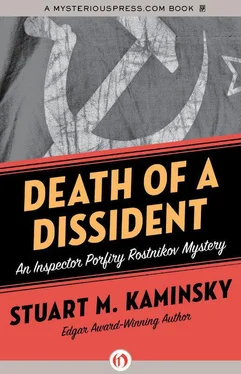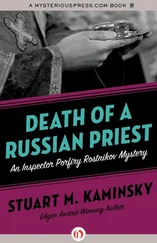Stuart Kaminsky - Death of a Dissident
Здесь есть возможность читать онлайн «Stuart Kaminsky - Death of a Dissident» весь текст электронной книги совершенно бесплатно (целиком полную версию без сокращений). В некоторых случаях можно слушать аудио, скачать через торрент в формате fb2 и присутствует краткое содержание. Год выпуска: 2012, ISBN: 2012, Жанр: Полицейский детектив, на английском языке. Описание произведения, (предисловие) а так же отзывы посетителей доступны на портале библиотеки ЛибКат.
- Название:Death of a Dissident
- Автор:
- Жанр:
- Год:2012
- ISBN:9781453266298
- Рейтинг книги:4 / 5. Голосов: 1
-
Избранное:Добавить в избранное
- Отзывы:
-
Ваша оценка:
- 80
- 1
- 2
- 3
- 4
- 5
Death of a Dissident: краткое содержание, описание и аннотация
Предлагаем к чтению аннотацию, описание, краткое содержание или предисловие (зависит от того, что написал сам автор книги «Death of a Dissident»). Если вы не нашли необходимую информацию о книге — напишите в комментариях, мы постараемся отыскать её.
Death of a Dissident — читать онлайн бесплатно полную книгу (весь текст) целиком
Ниже представлен текст книги, разбитый по страницам. Система сохранения места последней прочитанной страницы, позволяет с удобством читать онлайн бесплатно книгу «Death of a Dissident», без необходимости каждый раз заново искать на чём Вы остановились. Поставьте закладку, и сможете в любой момент перейти на страницу, на которой закончили чтение.
Интервал:
Закладка:
“What do you wish to discover, Tovarisheh?” she said with a cold look, which did nothing to intimidate Rostnikov, who was suddenly very hungry.
He sighed and plunged in:
“It seems coincidental to me that he should be allowed out of prison before his trial, that he should be killed so close to that trial and that the K.G.B. should not want to handle the investigation.”
“You think the K.G.B. might have killed him?” she said.
“No,” said Rostnikov. His stomach growled loudly. “If the K.G.B. wanted to get rid of him, they would be more careful, considering who he was, but a single agent provoked by a man like Granovsky might…”
“I see your point,” said the Procurator, folding her hands in front of her. “You will and do have permission to delicately make inquiries in that direction, but very delicately, you understand?”
“Very delicately,” he agreed. “A sickle, you say?”
“Yes, a sickle.”
“Symbol of the revolution,” he said softly.
“There is no accounting for the variances of the Muscovite mind,” she said without humor. “I have seen too much to try. Take it where you will, but remember the problems. You have the direct order of the Procurator General himself on this investigation. The world will know of this murder in a few hours. There are many in other countries and in our own who will be convinced that some force in the government is responsible.”
“And,” said Rostnikov placidly, “if they turn out to be correct?”
“Then,” she said, turning to her picture of Lenin for inspiration, “we will discuss it again. But assuming it is not, when we catch the murderer, we must have unshakable evidence of his guilt which the Procurator General can release and use to remove any conspiracy accusations. You understand?”
“Fully,” said Rostnikov, pushing himself up from the soft chair with effort. “I can expect the K.G.B. people to be hostile to my investigation. I can expect the friends of this Granovsky to be hostile because they distrust us and fear for their own safety. I can expect neutral witnesses to hide and pretend they know nothing. In short, a typical murder.”
“Yes,” she said, turning back to face him. “Except we do not have a great deal of time. The faster we know what happened, the sooner we can prevent any international incident over this. If we get nowhere in two or three days, we can expect the case to be taken out of our hands.”
“Which will not look good on our record,” said Rostnikov without concern. Timofeyeva and Rostnikov exchanged very slight smiles. He had no hope of becoming a procurator and no desire to become one. He was too old, had a Jewish wife, and was quite content to be an investigator. If anything would prod him into extra effort, it would be pride.
“I have no doubt that you will do your best,” she said.
“I will do better if you allow me to take Karpo and Tkach off the cases they are working on and assign them to this,” he said, standing at the door.
The Procurator looked at the pile of reports on her desk. Five of them belonged to the two junior investigators in question.
“Take them,” she said.
“Thank you,” replied Rostnikov respectfully and left the cold office to search for something to drink before he called the two men who would be helping him find what appeared to be a very mad or very clever murderer.
CHAPTER TWO
At three o’clock in the morning, New York City is vibrating with neon, pulsating with bodies in doorways, and even the most remote streets of Queens are not surprised by a scream or laughter. At three in the morning, Paris streets are alive with casual strollers, policemen, and drunks. But at three in the morning, Moscow is a city of echoes and shadows, its streets deserted and silent. In Moscow the liquor stores close early, the restaurants at midnight, and the metros at one. A few taxis prowl the streets with three or four bottles of vodka under the front seat to sell at double the store price to thirsty insomniacs. Moscow begins work at five in the morning. The few hours before are for the criminals, the police, taxi drivers, government officials at parties, and party officials working on government.
At three o’clock this morning Viktor Shishko sat at his German-made typewriter in the office of Moscow Pravda carefully wording a story on the death of Aleksander Granovsky. The only information he had was that given to him by Comrade Ivanov who, in turn, got the information from the Communist Party member who served as liaison with the various Russian investigatory agencies. Viktor wrote what he was told. It took him fifteen minutes. The next step was to drink some strong black coffee, look out the window at the snow, and wait, knowing that the story would probably be killed or rewritten by someone else even though it was and would be no more than ten lines at most. Even then the governing committee of Pravda might kill it entirely at their morning meeting. He considered going to the toilet, but sighed and decided to wait in the hope that the call might come through and still give him the chance to get a few hours of sleep. His neck felt gritty in spite of the cold draft from the window. He made a promise to himself to take a cold bath if the call came through and he got home within an hour.
At three o’clock that morning three very young men in black leather jackets and jeans were clearing out the back of a small truck. All three wore their hair long and brushed back like American pictures they had seen of James Dean or Polish pictures of Zbigniew Cybulski. Both Dean and Cybulski had died violently and young. At least two of the three young Muscovites half-longed for the same fate and imagined an underground reputation that they would not be around to experience. All three had taken American nicknames, “Jimmy,” “Coop,” and “Bobby,” all three had guns, all three wore fixed smiles, all three were frightened by what they had been doing and were about to do.
At three o’clock that morning, Rudolt Kroft was cleaning his police uniform, which was odd. It was odd not because it was three o’clock in the morning, but because Rudolt Kroft was not a policeman. He lived in a four-story wooden building that sagged dangerously to the left, which may have been politically valid as a metaphor, but held no meaning other than structural for Kroft and the other tenants. Kroft, in contrast to his building, sagged to the right as a result of a circus accident many years before. He was still agile and a capable actor as evidenced by his successful role as policeman for the last few months, but he was also cold, very cold in his sagging building of outcasts and foreigners. It pleased him to stay warm by cleaning the uniform and thinking of his role for the coming day.
At three o’clock that morning Ivan Sharikov dropped his fare on Lenin Avenue and accepted the eighty kopeks fare, knowing he would get no tip. Party officials gave no tips and Ivan expected none. The fare, heavily bundled and in bad humor, had slipped getting out of the cab as he walked to his apartment door. Ivan, whose neck was fat and slow, turned away hiding a satisfied grin, and flipped on the green light in his windshield to show he was free to take another fare. He slowly put his taxi into gear and backed into the street slipping as the thin, nearly bald tires tried to grab the street and clawed only at ice.
Ivan’s prospect of making any real money that night was slim, but he owed too much and knew he could not sleep anyway with the pain in his back. When the pain got really bad, he considered going to the clinic, but the clinic wait might be hours, and the doctor, if he even got to see one, would send him back to work with meaningless pills or worse, he would be sent to the hospital ward and lose his chance to make up some of the money he owed his brother-in-law. In the old days, even a dozen years ago, he could have told his brother-in-law what to do with his loan, but time had reversed their positions. Ivan had grown fat, old, and tired and Misha had grown lean, hard, and resentful from his years at the packing house.
Читать дальшеИнтервал:
Закладка:
Похожие книги на «Death of a Dissident»
Представляем Вашему вниманию похожие книги на «Death of a Dissident» списком для выбора. Мы отобрали схожую по названию и смыслу литературу в надежде предоставить читателям больше вариантов отыскать новые, интересные, ещё непрочитанные произведения.
Обсуждение, отзывы о книге «Death of a Dissident» и просто собственные мнения читателей. Оставьте ваши комментарии, напишите, что Вы думаете о произведении, его смысле или главных героях. Укажите что конкретно понравилось, а что нет, и почему Вы так считаете.












